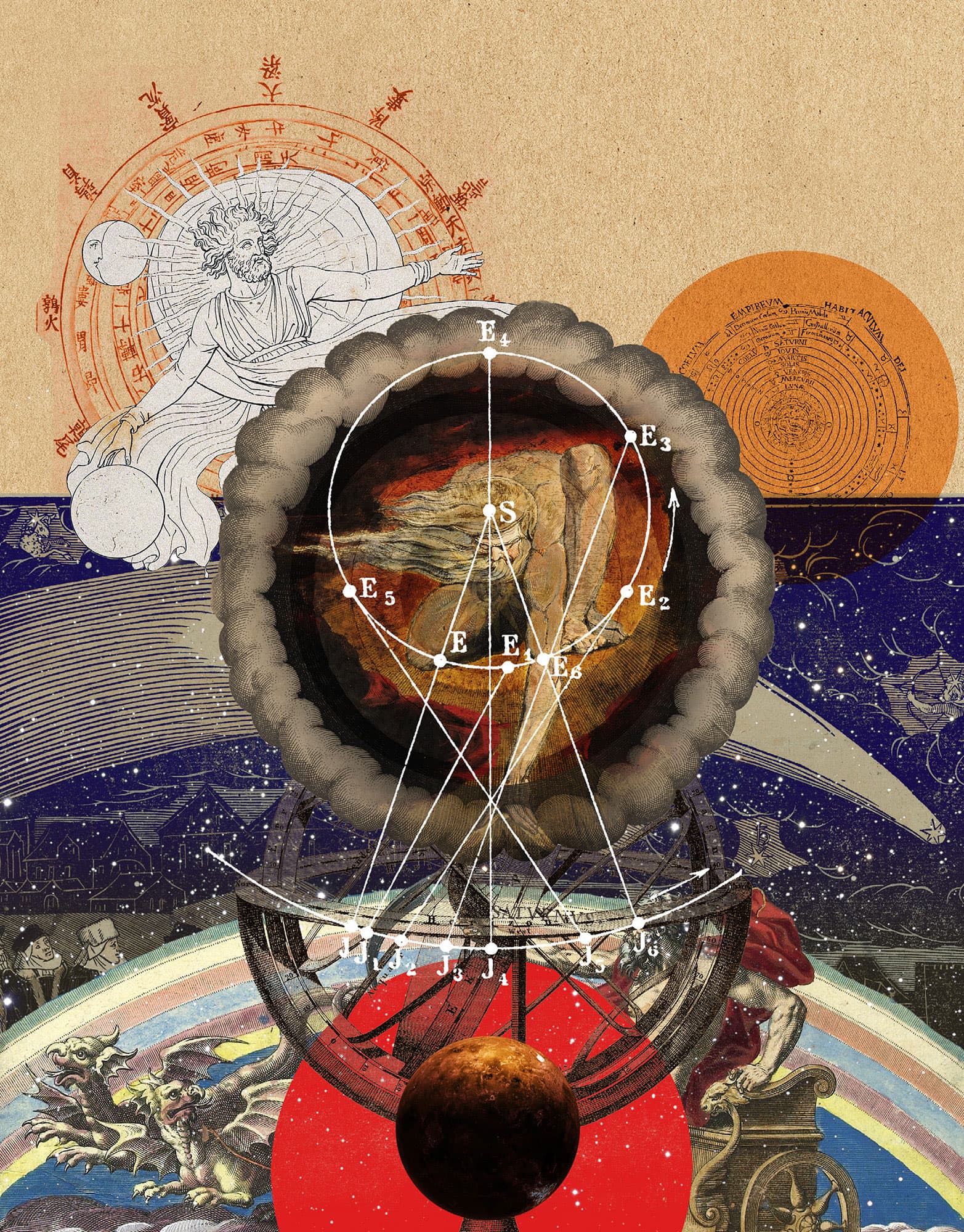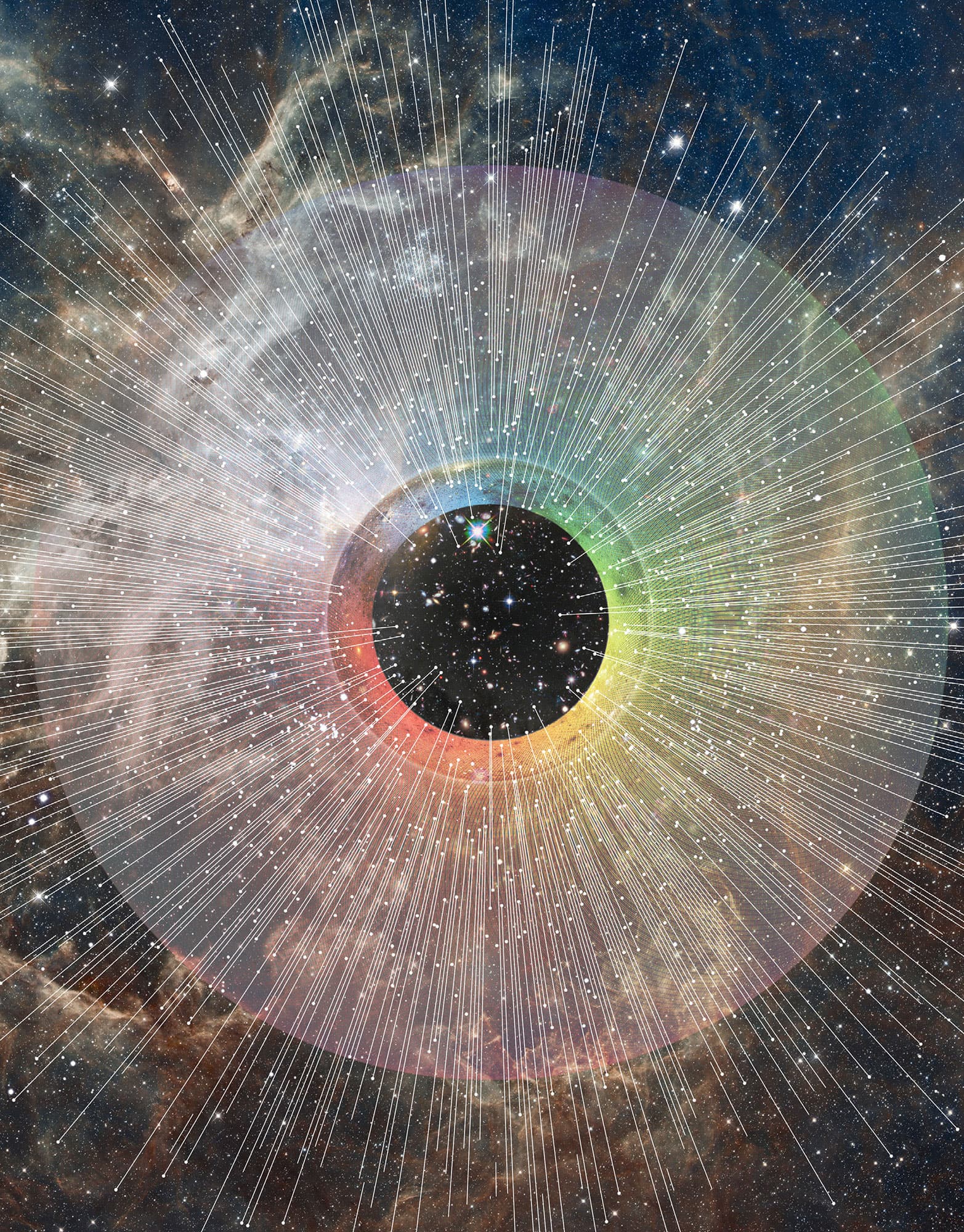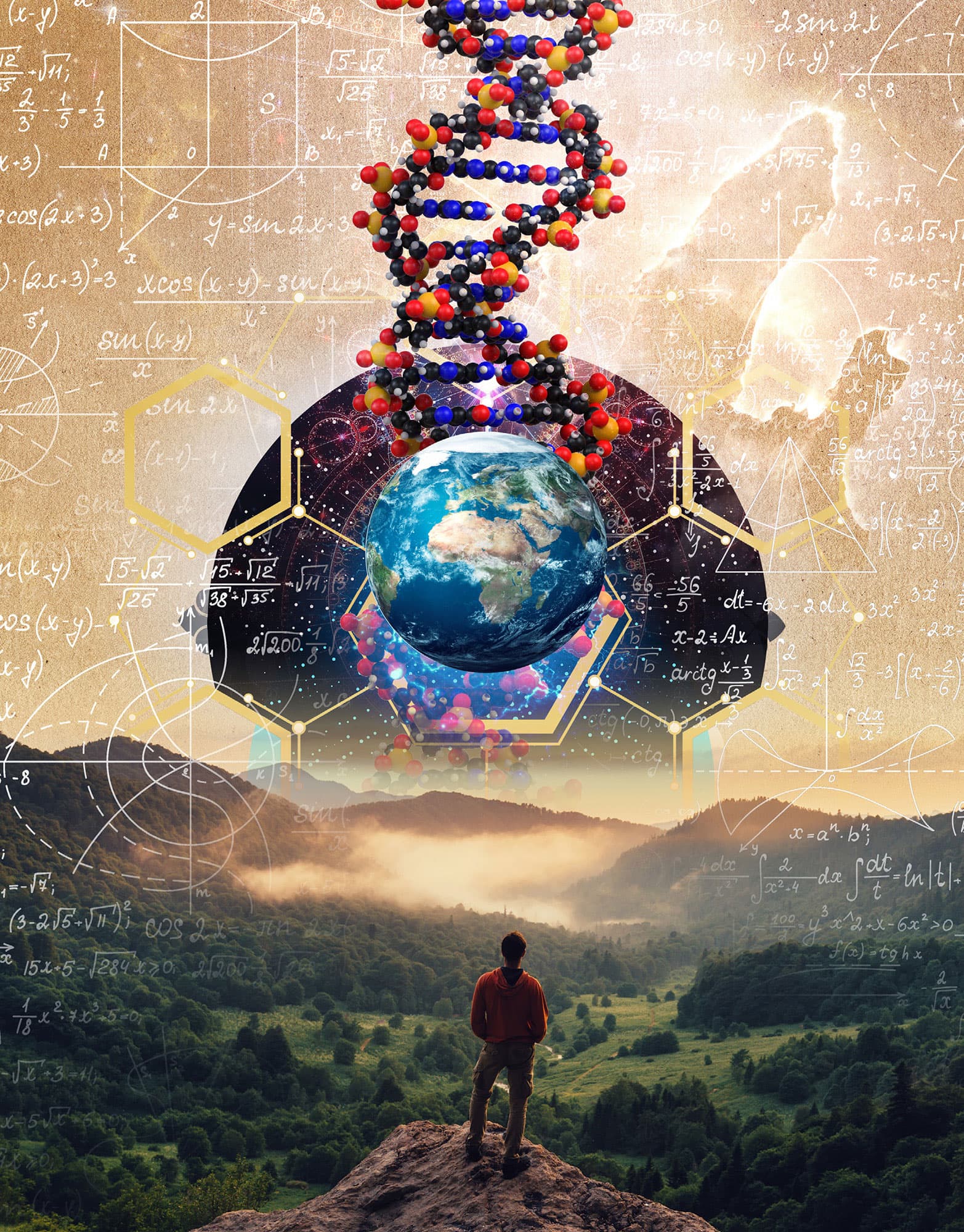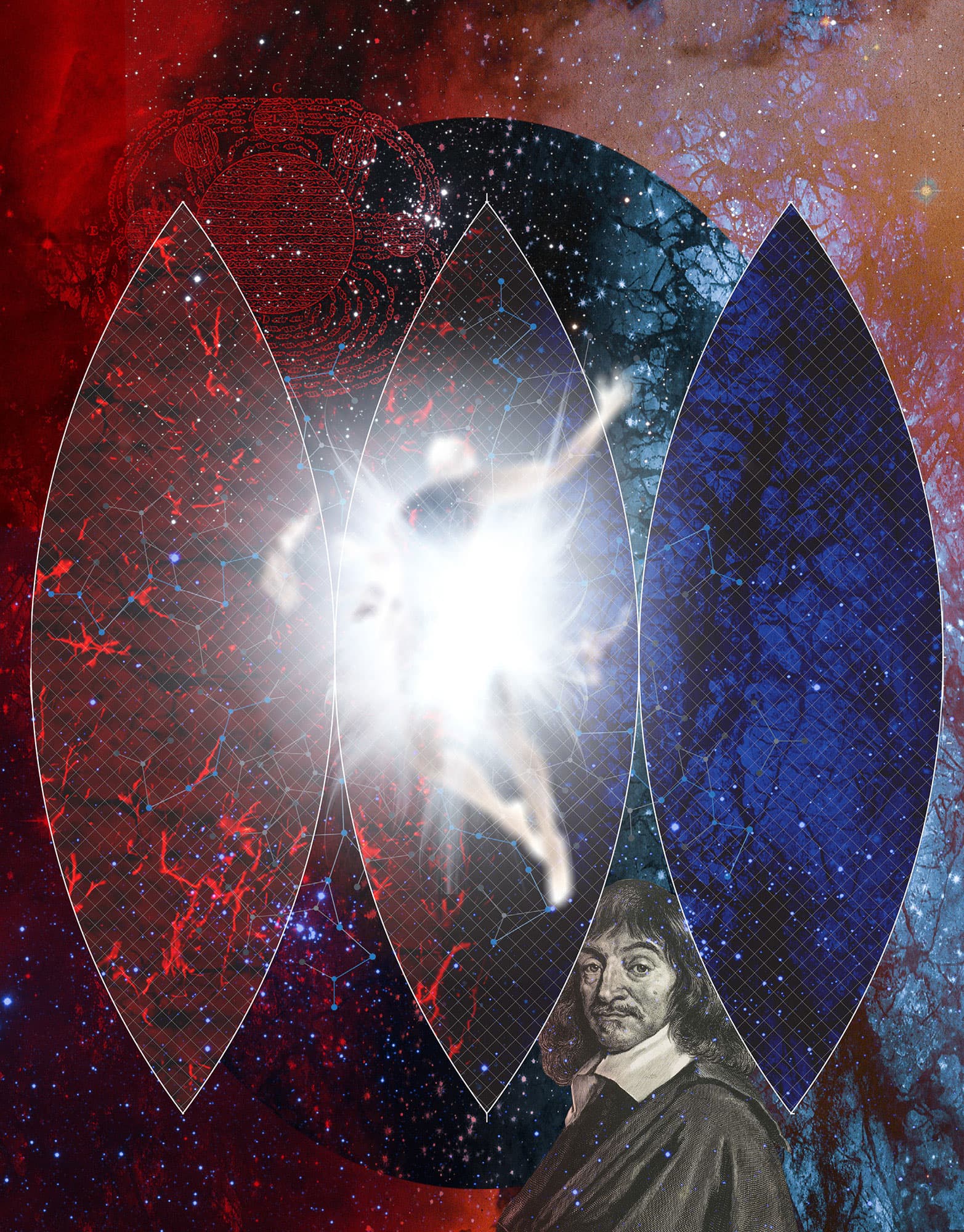
METAPHYSICAL UNIVERSE
METAPHYSICAL UNIVERSE
GLOSSARY
Copernican principle The idea that the Earth, or even the galaxy should not be a special place in the universe, but that we are observing the universe from a typical location in it.
cosmic horizon The edge of the observable universe, this horizon is set by how far light has been able to travel since the early universe (basically since the end of inflation).
cosmology The branch of astrophysics that concerns itself with explaining the physics of the origin and evolution of the entire universe as a single physical system, in religion this term is sometimes used to refer to creation beliefs.
deism A belief in a God as the ultimate mechanism for the creation of the universe.
existentialism A type of philosophy concerned primarily with existence (characterized by asking questions about why we exist, or what the meaning of life is).
metaphysics forms Metaphysics is the branch of philosophy that asks what there is. A ‘metaphysics form’ is a concept first mentioned by Plato, and in its simplest form it is a property of things that exist – for example, that they are round, or transparent.
monad An indivisible entity. In the physical universe, an electron or a quark might be a monad.
neuropsychology The branch of science that focuses on how the brain works.
prime mover In the philosophy of Aristotle the prime mover was the source of all motion in the universe.
sufficient reason In philosophy this is the belief that everything must have a reason (or a cause).
theism Belief in the existence of one or more supreme beings, or gods.
underdetermination A circumstance where there is not enough information to make an informed decision between two or more possible explanations for what has been observed. For example, in cosmology, the accelerated expansion of the universe could be caused by an unknown energy source (dark energy), or could be pointing to a subtle change in the laws of gravity.
ANCIENT UNIVERSE
the 30-second blast
How did the universe come to be – or the Earth, or the sky, or the stars? Almost none of our ancient ancestral cultures conceived that the ground beneath them was actually a spherical planet orbiting a spherical sun within a disc-shaped galaxy. Almost all, on the other hand, imagined that the universe had some sort of beginning when light emerged from darkness – this usually, but not always, coming about through the actions of supernatural elements or entities. By the time the ancient Greek, Persian and Chinese civilizations were flourishing, people had developed sophisticated cosmologies to explain the motions of the stars and planets as well as other celestial phenomena. Those that had developed astronomy and mathematics further posited geometric models of the structure of the universe, often based on philosophical concepts of order, beauty and symmetry. One general point of consensus among the ancients, however, seems to have been that Earth was the centre of the cosmos – which is known as the ‘geocentric’ model of the universe. Considering that ancient humans had no way of looking at our planet from a non-earthbound perspective, that error seems in retrospect to be entirely understandable and a reasonable assumption based on the evidence to hand.
3-SECOND FLASH
In every civilization throughout history humans have contemplated the cosmos, but it wasn’t until we invented the tools and methods of science that we started to unlock the mysteries of the universe.
3-MINUTE EXPANSION
At least one astronomer in ancient times advocated a ‘heliocentric’ model of the universe – one in which Earth moves around the Sun rather than the other way around. Aristarchus of Samos (c. 310 BCE–c. 230 BCE) is reported by later sources to have correctly deduced the order of the planets out from the Sun and that days and nights are caused by Earth’s rotation rather than the Sun’s motion. Regrettably, none of his writings is known to have survived.
RELATED TEXTS
See also
3-SECOND BIOGRAPHY
CLAUDIUS PTOLEMY
c. 100–c. 170 CE
Wrote the definitive astronomical tome of the ancient world, known today as the Almagest, that described in great detail the geocentric model of the universe prevalent in Western civilization until the sixteenth century
Even without modern science, our ancient ancestors developed sophisticated cosmological models of our universe.

UNIVERSE HYPOTHESIZED
the 30-second blast
In his aptly titled Metaphysics, the ancient Greek thinker Aristotle posited the existence of one or more ‘prime movers’ that set into motion and continues to guide the movement of the stars and planets in the heavens. Metaphysicists of the late Renaissance and early Enlightenment, perhaps motivated by the religious and societal assumptions of their time, offered the argument that the existence of the universe could only have come about if a godlike power or being existed, too, thus proving the existence of a deity. This so-called ‘cosmological argument’, in turn, branched either towards theism, in which the godlike entity remains actively involved, or deism, in which the deity sets the universe off and then ceases to have any involvement. With the advent of scientific enquiry, cosmology shifted gradually from ‘deductive’ reasoning, where what follows comes only from the logical inputs and is thus true with no additional information, to ‘inductive’ reasoning, where hypotheses extend beyond the inputs and thus need further information to be proven one way or the other. With the advent of modern science metaphysics has become a purely intellectual pursuit, whereas study of the physical nature of the universe is conducted through prediction, testing and measurement.
3-SECOND FLASH
Using reason and logic, philosophers have long sought to construct how the universe and everything in it came into being and continues to be.
3-MINUTE EXPANSION
One key point of metaphysical debate is whether anything exists that is permanent and true, regardless of any passage of time or changes in the universe. Various philosophers have given names such as ‘forms’, ‘monads’, and ‘things in themselves’ to such universal truths, ascribed different properties to them and suggested various ways that humans in the constantly evolving cosmos might gain access to them through thoughts and actions. Very few philosophers, however, have ever defined what these truths actually are.
RELATED TEXTS
See also
3-SECOND BIOGRAPHIES
ARISTOTLE
384–322 BCE
Ancient greek thinker and author of Metaphysics, the first full-length work on how everything came into being and continues to ‘be’
GOTTFRIED WILHELM LEIBNIZ
1646–1716
German mathematician-scientist and celebrated philosopher, who based his metaphysical arguments on various principles, one of which was ‘sufficient reason’: there must be sufficient reason for anything to exist, including our universe out of all possible universes
Does the universe run like clockwork, or is it continually experiencing active supernatural guidance?

UNIVERSE OBSERVED
the 30-second blast
Our universe is the only one we humans have experienced, and we exist inside it – the cosmos is inescapably all around us. That means we cannot compare our ideas about the universe with any other universe, and we cannot fully isolate ourselves from the universe to think about it from an external viewpoint. Metaphysically then, the universe must be consistent not only with what we observe of it but also with the fact that we exist to observe it; additionally, we must take into account that our observations are inextricably tied to our own capabilities and limitations to interpret what they imply about the universe. Adding to this metaphysical quandary is that no matter how good we get at making astronomical observations we will still never be able to see the full picture. The cosmic horizon – the boundary determined by the speed of light and the time elapsed since the Big Bang – is growing but not fast enough ever to compass the whole universe. That means everything we know about the universe applies for sure only to a small portion of it, and we must make assumptions about the relationship between what things are like here – that is, within the cosmic horizon – and what things are like elsewhere.
3-SECOND FLASH
The universe as we know it presents a philosophical challenge unlike any other because of its uniqueness, ubiquity and underdetermination.
3-MINUTE EXPANSION
Cosmologists today lean on a pair of centuries-old concepts to reconcile the unavoidable underdetermination of the universe, known today as the ‘Copernican principle’ (colloquially, ‘we’re nowhere special’) and the ‘cosmological principle’ (‘everywhere is the same’). These principles likely hold very well for this moment in time – but what we know about the history of the universe seems to suggest that our moment in time may itself be special and different from other epochs since the Big Bang.
RELATED TEXTS
See also
3-SECOND BIOGRAPHIES
HERMANN BONDI
1919–2005
THOMAS GOLD
1920–2004
FRED HOYLE
1915–2001
Astrophysicists who explored the idea that the universe is statistically static and unchanging throughout all of space and time – a metaphysically attractive model that has been shown through observations to be incorrect
We humans, for better or worse, will never be able to view the universe in its awesome fullness.

KNOWING THE UNKNOWABLE
the 30-second blast
Scientific knowledge is obtained by observing phenomena, finding patterns or laws in those observations, making informed guesses as to why those laws exist, testing these guesses by predicting as yet unobserved results and then confirming or refuting those predictions through new observations. Science can be a complicated process, especially given that confirming predictions can entail huge amounts of time and effort to design and conduct carefully controlled experiments or calculations. Yet, despite that, a great deal of what we know – or, at least, what we think we know – cannot yet be confirmed or may not even be confirmable. Over the centuries many metaphysicists have concluded that our inevitable ignorance at the limits of scientific knowledge necessarily implies the existence of supernatural design or an omniscient divinity. Others have rejected that view, believing instead that all the gaps in our knowledge will eventually be filled and attributed to natural processes. Perhaps a metaphysical middle ground is most appropriate – science, after all, is designed to explain what is natural rather than to confirm or refute that which is supernatural.
3-SECOND FLASH
If something happens in the universe that we don’t or cannot ever understand, is it because a deity, or deities, or some other supernatural entities were responsible?
3-MINUTE EXPANSION
Non-scientific knowledge – logical axioms or strongly held beliefs, for example, perhaps passed down by figures of authority or institutions and which have neither been tested nor confirmed – far pre-dates scientific knowledge and shapes human society and behaviour at least as fundamentally. People differ in the ways they prefer to approach the unknown; one way may be better than another in specific circumstances, but, metaphysically speaking, there is no single way that is always better than every other.
RELATED TEXTS
See also
3-SECOND BIOGRAPHY
PIERRE-SIMON LAPLACE
1749–1827
Considered by many to be the greatest French scientist and mathematician, he is famously quoted as saying that the orbits of the planets around the Sun do not require the intervention of a creator to remain stable
Unsatisfying as it may feel to some, evidence-based and faith-based knowledge might be reconciled only by acknowledging that they will continue to coexist and complement and never cancel one another out.

WHY ARE WE HERE?
the 30-second blast
As we humans understand and discover more of the scientific theories and laws of nature that describe how the universe works, it has become increasingly clear that random processes could well have led to the existence of our species, our planet and maybe even the entire universe. Many metaphysicists have interpreted this knowledge to mean that our lives, our societies and our universe have no deeper meaning than what we observe has arisen from any other physical and chemical processes – any animal, vegetable, mineral or, indeed, anything else exists simply by chance. If this is the case, then the less we try to impose purpose on or judge the value of what we do the more insight and less existential angst we will experience. Many other metaphysicists, however, hold the opposite view. To them, the fact that the universe has developed part of itself – us – to be able to contemplate it is truly remarkable. Accidental or not, our existence and the purpose we ascribe to it defines the purpose of the universe, at least in part. It follows then that, if so, those who deny that humanity has any kind of higher cosmic calling are choosing to abdicate responsibility for their own thoughts or actions.
3-SECOND FLASH
Modern cosmology does not require that our existence in the universe serves a higher purpose – but that does not mean that it doesn’t.
3-MINUTE EXPANSION
Those metaphysics that have bases in religion often assume the universe has divine origins and tend to have well-established codes of behaviour, morals and ethics that would have humanity fulfil a purpose as conceived by the divine creator(s). Atheistic metaphysics also incorporates moral and ethical codes but tend to derive their value either from historical evidence or future predictions about how human society has fared or would fare if they are or are not followed.
RELATED TEXTS
See also
3-SECOND BIOGRAPHIES
JEAN-PAUL SARTRE
1905–80
SIMONE DE BEAUVOIR
1908–86
French writers who philosophized extensively about existentialism; they asserted that all meaningful metaphysical truths originate from individuals interacting with the universe rather than from divinities or institutions providing them to individual
We humans search for meaning in the cosmos; does that mean our existence is cosmically meaningful?

COSMIC CONSCIOUSNESS
the 30-second blast
Scientific studies of human neuropsychology appear to show that human consciousness is an emergent property of biological processes. When a complex structure like a brain evolves within an organism, its very complexity leads to unexpected results – specifically, in this case, the organism becomes aware of its existence beyond simple reactions to its sensory stimuli and begins to think about itself, its environment and its past and future. This has given rise to language, mathematics, science, culture, society, civilization, technology and more, with apparently limitless potential for advancement and progress – or, perhaps, destruction. The human brain is an extraordinary thing to be sure – but we now know that many other structures in the universe, and indeed the universe itself, are far more complex. It seems entirely plausible, then, that something akin to consciousness, maybe far more profound or more developed than we humans could ever comprehend, has emerged in or, indeed, out of the cosmos. In many of the world’s religions, wisdom traditions and science-fiction writings the existence of a higher consciousness (or beings that possess it) is assumed. Thus far, however, no meaningful scientific evidence of any such phenomenon has been detected.
3-SECOND FLASH
How is it that we, seemingly so insignificant in the universe, are somehow able to contemplate the whole universe and everything within it?
3-MINUTE EXPANSION
Human consciousness has a consequential impact upon our environment because it causes humans to behave in ways that otherwise might not be statistically expected. Intentional activities – being kind to strangers with no thought of personal gain, for example, or seeking new knowledge only for curiosity’s sake – can lead to remarkable societal transformation. If the universe harbours even deeper consciousness than the human variety, could the entire universe itself be unexpectedly transformed as well?
RELATED TEXTS
See also
3-SECOND BIOGRAPHY
RENÉ DESCARTES
1596–1650
French mathematician and philosopher who famously penned the phrase ego cogito, ergo sum (I think, therefore I am), which became a cornerstone of philosophical contemplation of self-awareness and consciousness
As much as we humans value our intelligence, we can only guess at the levels of sentience and awareness that exist beyond our comprehension.
